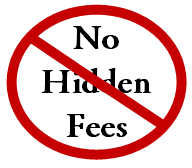Back in May, we noted that the new 401(k) disclosure rules would be in effect by the end of the summer. The intent of these rules was to provide greater transparency to both employers and employees. Did it work and have you noticed a difference in the reporting?
 The new 401(k) fee disclosures
The new 401(k) fee disclosures
The law is intended to help employees receive information about the fees and expenses associated with the investments held in their 401(k). Specifically, the administrators are to disclose the investment management fees, legal fees, and accounting fees. In addition, individual expenses are also to be disclosed such as the costs related to taking out a loan against your 401(k) plan which is not uncommon these days.
The new rule also requires that participants receive statements at least quarterly showing the cost of the fees and expenses, as well as a description of what the charges cover. Information about historical investment performance also must be provided, and the information must include a chart to make it easier to compare available investment options.
What was the result of the new disclosures?
Despite the new disclosures, employers and employees still have to sift through a pile of information to identify the exact amount and type of fees charged under their plan. There is still an awful lot of product and sales information in the 401(k) disclosures. If you don’t have a finance background, it may be difficult to really understand your plan.
What should I do?
If you don’t understand the fee structure, it would be wise to first ask the plan provider and then to seek professional help. If you have an existing relationship with a tax or financial professional, it’s likely that they’ll provide a consultation on your plan for free. But, even if it does cost a few bucks, it’s certainly worth it. A study completed for the Investment Company Institute found that median fees were 0.72 percent of assets, or about $350 per participant who had an average account balance of $48,522. But, over a 30 to 40 year career, this amount can add up and equate to tens of thousands of dollars paid in administrative fees. Thus, negotiating the fees down by even 10 to 20 basis points can make a big difference.
Review of the new disclosures
It’s a step in the right direction, but more work needs to be done. Each retirement plan provider has a different interpretation of the rules, which translates into certain plans with better reporting than others. You need to press your provider for more details and don’t be afraid to ask them questions.
More 401(k) questions? Ask a tax professional.
Related Articles
->Are You Putting Any Nontraded Assets into Your IRA or Roth?
->You Will Soon Find Out How Expensive Your 401(K) Plan Is
->When is the Actual Deadline to Contribute to My 401(K)?
->Does It Make Sense To Borrow From My 401(k)?
->Missed the Deadline to Contribute to Your 401K & Exploring an IRA
->Can Exercising Stock Options Trigger Alternative Minimum Tax?


